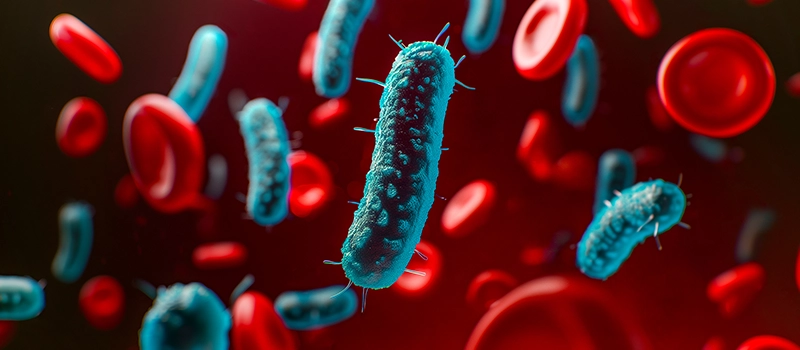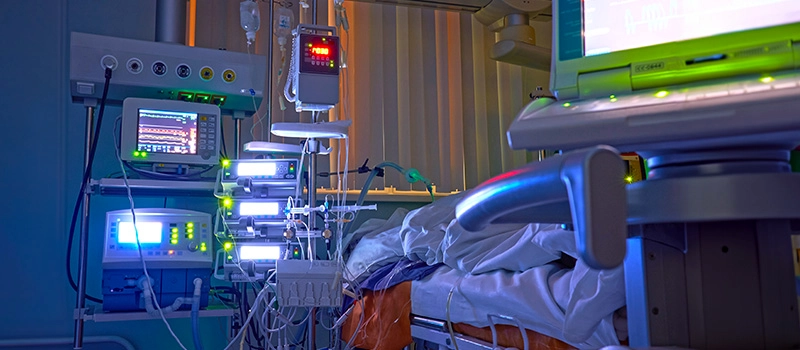
Role of a Critical Care Specialist
A critical care specialist, also known as an intensivist or critical care physician, plays a crucial role in the management of critically ill patients. Their main duty is to offer specialised medical attention to patients with grave injuries or life-threatening illnesses. The majority of the time, critical care specialists operate in intensive care units (ICUs) in hospitals, while they may sometimes be called upon to provide care while being transported or in specialised facilities for the treatment of the critically ill. In complex medical circumstances, their knowledge is essential for enhancing patient outcomes and preserving life. They closely monitor and treat patients with urgent medical needs. They closely watch over trauma victims and treat major infections with multiple organ failure. Critical care specialists treat a wide range of conditions, including:
- Heart failure
- Stroke
- Renal failure
- Respiratory failure
- Severe infections
- Multiple organ failure
- Trauma
- Burns
- Poisoning
- Postoperative complications, etc.
Critical care medicine is a multidisciplinary and multi-professional field of medicine. Considering the unavoidable need for a full-time critical care specialist, NMC has mandated the establishment of a critical care medicine department in all healthcare facilities and medical colleges to provide the timely utmost treatment of emergency cases.
Specialists in critical care are crucial to the healthcare system. They are skilled in employing technology for life support and managing complicated medical issues. To give their patients comprehensive treatment, they also collaborate closely with other healthcare specialists including nurses, respiratory therapists, clinical pharmacologists, occupational therapists, and others.
Specific Role and Responsibilities of a Critical Care Specialist
- Extensive Patient Assessment: Critical care professionals are educated to assess a patient’s status rapidly and precisely. They must have a comprehensive knowledge and approach to deal with all kinds of specialties emergencies to an extent. They offer seriously ill individuals extensive medical care. They use clinical expertise, medical history, physical examination, and diagnostic procedures to ascertain the gravity of the sickness or damage. This entails handling a variety of medical conditions, including organ failure, infections, trauma, respiratory failure, heart problems, and more. They are responsible for obtaining and interpreting orders for imaging investigations, laboratory testing, and managing and prescribing drugs.
A critical care specialist is expected to master the procedures and fundamental aspects of treating a critically ill patient including:
- Airway management
- Oxygen and Inhalation therapy
- Mechanical Ventilation
- Invasive and non-invasive hemodynamic monitoring
- Use of cardiac pacemakers
- Performance and interpretation of ECG
- Use of defibrillators/external pacemakers
- Diagnosis of brain death
- Lumbar Puncture
- Support of an organ donor
- Insertion of peritoneal dialysis catheter
- Management of peritoneal dialysis
- Insertion of hemodialysis catheters
- Safe transport
- Interpretation of routine radiology; computerized tomography; ultrasonography; MRI and EEG/EMG.
- Bronchoscopy
- Ultrasound-guided procedures
- External ventricular drain insertion
- Intracranial Pressure measurement
- Decision-Making and Quick Response Attitude: They make decisions that are crucial to the patient’s treatment plan, including whether to utilise medicine, ventilator support, and other life-saving measures. Critical care specialists decide on the start and modification of treatment regimens. They carefully weigh the advantages and disadvantages of various treatments and drugs. They must take into account the patient’s general health as well as the possible drawbacks and advantages of various treatment alternatives. Mental alertness and a quick response attitude are must-haves for a critical care expert. Keeping a check on all the equipment and basic required tools for treating the critically ill at all times is highly crucial to avoid unnecessary chaotic situations at times of emergency.
- Monitoring and Diagnostic Expertise: Critical care professionals keep a tight eye on a patient’s vital signs, test data, organ performance, and other condition markers. They track changes in real-time using sophisticated monitoring equipment and modify therapy as necessary. They are skilled in interpreting a variety of diagnostic procedures, including laboratory results, radiographic studies, and monitoring data, to establish precise diagnoses and treatment choices.
- Ventilator Management: To assist their breathing, many critically sick patients need mechanical ventilation. To ensure that patients receive the proper settings and modifications for their ventilators, intensivists are knowledgeable in this area. They keep a check on the functioning of life-support systems like ventilators and dialysis units.
- Excellent Communication and Patient Advocacy: Critical care experts constantly interact with the families of their patients to address concerns, discuss treatment choices, and provide updates on their health. In times of crisis, effective communication is essential. Critical care specialist doctors need to possess the requisite abilities in addition to the necessary knowledge to handle crises and difficult situations when a patient’s life is in danger. Because of this, an intensivist must constantly monitor the patient’s status and, in the event of any issues, act rapidly to resolve them so that the patient is no longer in danger and may proceed with his or her recovery.They act as a voice for their patients, ensuring that they get the finest treatment possible and that their moral and medical requirements are addressed. In addition, an intensivist serve as a crucial conduit between the patient and his family. Not just the sufferer, but also his or her family, who are perpetually frightened and concerned require emotional support through difficult times.
- Interdisciplinary teamwork and Care Coordination: To deliver comprehensive and coordinated treatment to critically ill patients, they collaborate closely with a diverse team of healthcare professionals, including nurses, respiratory therapists, clinical pharmacologists, occupational therapists, and others. They collaborate with members of a multidisciplinary team to avoid any lapses in the treatment. To give critically sick patients thorough treatment, cooperation is necessary.
- Procedures: They have received training in a variety of critical care procedures for patient stabilisation, including intubation, central line installation, administration of mechanical ventilation, invasive monitoring procedures, renal support, and bedside treatments to deal with urgent medical conditions. They could carry out a range of operations, including maintaining sophisticated medical equipment and placing chest tubes, arterial lines, and central lines. Of course, a specialist working in an ICU or trauma unit should be knowledgeable about technology and skilled in the clinical management of critical care.
- Resuscitation and Quality Improvement: Intensivists are frequently called upon to direct resuscitation efforts during emergencies, including cardiopulmonary resuscitation (CPR), emergency medicine, advanced life support procedures, or advanced medical procedures. They actively take part in efforts to enhance patient outcomes engage in quality improvement initiatives within the ICU and improve overall quality of life.
- End-of-Life Care: When a patient’s condition is terminal or when aggressive treatment is not in their best interests, they are adept at delivering compassionate end-of-life care. Talking about hospice or palliative care services may be part of this.
- Research and Education: Clinical research and medical education are two areas in which many experts in critical care are active. They may instruct medical students, residents, and fellows, keeping abreast of the most recent developments in critical care medicine.
Learning from the Critical Care Medicine Course
The objective of the Critical Care Medicine Course is to make the medical professional skilled at the following modules:
- Basic Medical Sciences related to Critical Care Medicine
- Clinical – Etiology, diagnosis, and treatment of acute life-threatening medical and surgical diseases related to Critical Care Medicine
- Clinical – Procedures, interventions, professionalism, ethics, and research methods related to Critical Care Medicine
- Recent Advances in the field of Critical Care Medicine
The topics included in the critical care medicine curriculum for academically and clinically competent critical care specialists:
- Resuscitation and Initial Management of Acutely Ill Patients
- Diagnosis: Assessment, Investigation, Monitoring, and Data: Interpretation of the Acutely-Ill Patients
- Disease Management
- Organ System Failure
- Therapeutic Interventions/Organ System Support in Single or Multiple Organ Failure
- Peri-operative Care
- Critical Care of Children
- Transportation
- Physical & Clinical Measurement
- Research Methods (Includes Data Collection and Statistics)
- Breaking the Bad News
- Applied Anatomy, Physiology, Biochemistry & Pharmacology of the Human Body
- Quality and Patient Care
- Ethics/End-of-Life Care
- Medico-Legal Knowledge
- Organ Donation Procedure
Requirements for Becoming a Critical Care Medicine Expert
A skilled Critical Care Expert must be competent in the following:
- Critical care’s general and specialised attributes, including service management.
- Supervising long-term cooperative management strategies for more patients.
- Team leadership for the Intensive care unit (ICU).
- Mentoring and supervising younger coworkers.
- Information integration.
- Efficient operation of critical care services in a multi-specialty case.
- Capacity to schedule professional development in a way that contributes to the overall development of a specialty involving medical treatment, instruction, and research.
- Gain experience in diagnosis and treatment of acute, serious, and life-threatening medical and surgical diseases.
- Always conduct medical procedures and treat patients considering medical ethics.
- Effective communication skills and empathy in dealing with all situations.
Our Critical Care Simplified course is among the best online critical care courses for medical professionals. It provides comprehensive online critical care education. In addition to concentrating on certain organ systems throughout the course, learners will study a variety of critical care topics including resuscitation, trauma treatment, hemodynamic instability, neurological crises, and sepsis management. They will learn about the most recent developments in monitoring methods, infection control regimens, and critical care treatments. The training also emphasises the value of good inter-disciplinary critical care team communication and collaboration.
In conclusion, a critical care specialist’s duties include providing critically ill patients with specialised medical care and expertise, coordinating their care, making life-saving choices, and ensuring the best results for these patients. Their work is difficult and demands a high level of clinical proficiency, medical knowledge, and the capacity to deal with stressful circumstances.
Must Read: Benefits of Enrolling in a Critical Care Simplified Course


